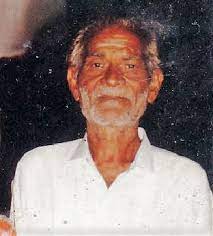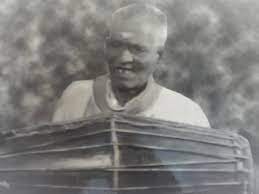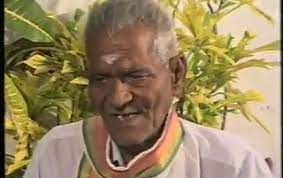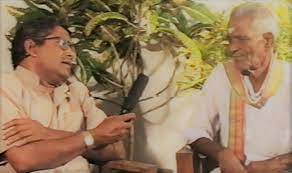K. Chellaiya Annaviyar
இந்தப் பக்கத்தை தமிழில் வாசிக்க: க. செல்லையா அண்ணாவியார்
K. Chellaiya Annaviyar was an Eezham koothu (dance/ drama) artist. Chellaiya Annaviyar was one of the very few Annavimars (koothu teachers) who was actively involved in both traditional as well as modern koothus. Joining with universities and schools, Chellaiya Annaviyar trained people in many koothus. Chellaiya Annaviyar was the right hand man of Prof. Vidyanandan in the koothu revival journey that began in the sixties. Chellaiya Annaviyar laid the foundation for the revival of koothu which translated into a functional education in the universities today.
Private Life
Chellaiya Annaviyar was born at Kaluwankerny village of Vantharumoolai in Batticaloa, Sri Lanka. He was known as Vandharmoolai Chellaiya Annaviyar. The Ministry of Culture of the Eastern Province used to provide Rs. 2000/- per month to the helpless veteran artists. During his last days, Chellaiya Annaviyar depended on this money though this did not come regularly.
Artist Life
Chellaiya Annaviyar was interested in the art from an young age. Chellaiya Annaviyar was interested in musical dramas. In the 1920s and 1930s, the Indian music and drama companies that came to Sri Lanka were of two types: Sankaradas Swamiji styled dramas filled with songs, and Parsi theatre styled dramas filled with dialogue and music. Chellaiya Annaviyar was attracted by both these styles of plays being held at the Welhasim Hall (Imperial Theatre) in Batticaloa town and learnt theatre skills through this theatre company. At young age, Chellaiya Annaviyar enacted by singing the roles of Sahadev and young Pulendran in the plays: Alli Arjuna, Pavalakodi and Pravahan. After the advent of cinema in the 1930s, this type of musical dramas became extinct, and Chellaiya Annaviyar focused on the traditional koothus.
At the age of 18, Chellaiya Annaviyar was attracted to the vadamodi koothus like Pururuva Chakravarthy and Subhadra Kalyanam and became fully involved in koothu. Chellaiya Annaviyar was impressed by the thrilling dance, the energetic songs and the decorations found in vadamodi koothu and became engaged in it. In his lifetime, Chellaiya Annaviyar practiced more than 20 koothus. In the north of Batticaloa, Chellaiya Annaviyar practiced koothu at Thampankadawai, Muthagal, Kandakadu and Karuppalai and in Batticaloa, at Ottamavadi, Murakkatansenai, Navaladi, Morsappity, Arayampathi, Thannamunai, Periyakallaru and Puthukkudiyiruppu. From 1947 to 1960, Chellaiya Annaviyar was engaged in the practice of full-length koothus. After 1958, Chellaiya Annaviyar was engaged in teaching koothu in the universities and schools. During the 1960 to 1966, Chellaiya Annaviyar taught koothu at the University of Peradeniya along with Prof. Vidhyanandan. Chellaiya Annaviyar first gained the experience of teaching koothu with the women. Chellaiya Annaviyar taught koothu to the Tamil students of The Royal College, Colombo. From 1972 to 1980, Chellaiya Annaviyar worked in koothu activities along with Vinson Dhiraviam Ramachandran, deputy officer of Vinson College in Batticaloa. Chellaiya Annaviyar staged two plays: Uthama Bharathan and Chenchotru Kadan Theertha Semmal, solely with women. Chellaiya Annaviyar was an Annaviyar of mathalam (musical instrument) in dramas like Sankaram Koothuru etc.
Students
- Selvaraja Annaviyar
- Naavaladi Kandhasamy
- Shanmugam Pankudaveli Babi
Awards
- In 1993, Chellaiya Annaviyar received the "Lankatilaka" award, the highest award given to a Sri Lankan artist from the President
- In 2002, Manmunai Cultural Council of Vibulananda Institute of Aesthetic Studies at Kallady, Batticaloa organized an Appreciation ceremony for Chellaiya Annaviyar.
- In 2008, Chellaiya Annaviyar was awarded with "Thalaikol Virdhu" by Eastern University.
Koothu Performances
- Karnan Poar (1960)
- Vaala Bhiman play (1969)
- Dharmaputhra play (1970)
- Subhathrai Kalyanam
- Pashupatastram
- Noandi play
- Raavanasenan
- Vaali vadhai
References
- "Nadagam - Arangiyal : Palayathum Pudhiyathum" - Professor C. Maunaguru, Kumaran Puthaga Illam, Columbo - Chennai 2021.
- Aryampathi - Murannagaiyana Oru Vazhvu - Vandharmoolai Chellaiya Annaviyar - Maunaguru
⨮ Standardised-en
Please do not write any content below this line. This section is only for editing templates & categories.




